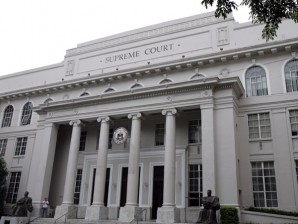What Went Before: Case of aborted awards for 4 Arroyo Artists
MANILA, Philippines—On July 6, 2009, President Gloria Macapagal-Arroyo signed seven individual proclamations conferring the 2009 Order of National Artists on theater stalwart Cecile Guidote-Alvarez, filmmakers Manuel Urbano (aka Manuel Conde) and Carlo Magno Jose J. Caparas, visual artist Federico Aguilar Alcuaz, novelist Lazaro Francisco, architect Francisco Mañosa and fashion designer Jose “Pitoy” Moreno as National Artists.
The announcement drew criticisms and protests among artists’ groups, which protested that of the seven new awardees, only three—Conde, Alcuaz and Francisco—were shortlisted by the selection committee composed of members of the National Commission for Culture and the Arts (NCCA) and the Cultural Center of the Philippines (CCP).
They noted that the committee had recommended composer Ramon Santos for the title, but his name was dropped from the list to give way to Alvarez, Caparas, Mañosa and Moreno because of the so-called presidential prerogative.
Palace defends choices
They said Arroyo’s use of presidential prerogative “disregarded” and “cheapened” the selection process prescribed by law.
Article continues after this advertisementMalacañang defended its choices, saying it stood by the “qualifications, qualities, track record and the reputation of those who were named special artists.”
Article continues after this advertisementOn Aug. 19, 2009, a group of petitioners including National Artists Virgilio Almario, Benedicto Cabrera, Napoleon Abueva and Arturo Luz, as well as academicians and members of the Concerned Artists of the Philippines asked the Supreme Court to stop the conferment of the rank and title of National Artist on Alvarez, Caparas, Mañosa and Moreno.
“The appointment to the Order of National Artists is a discretionary power on the part of the President. Clearly, however, the discretion is not absolute nor is it unlimited,” the petition partly read.
On Aug. 25, 2009, the Supreme Court stopped Malacañang from conferring National Artist titles on the nominees it had approved for that year.
Specifically, the high court enjoined the public respondents that included Executive Secretary Eduardo Ermita, Budget Secretary Rolando Andaya Jr., the NCCA and CCP from “conferring the rank and title of the Order of National Artists on private respondents (the four questioned awardees), releasing the cash awards that accompany such conferment and recognition, and from holding the acknowledgment ceremonies for recognition of the private respondents as National Artists.”—Inquirer Research
Source: Inquirer Archives
